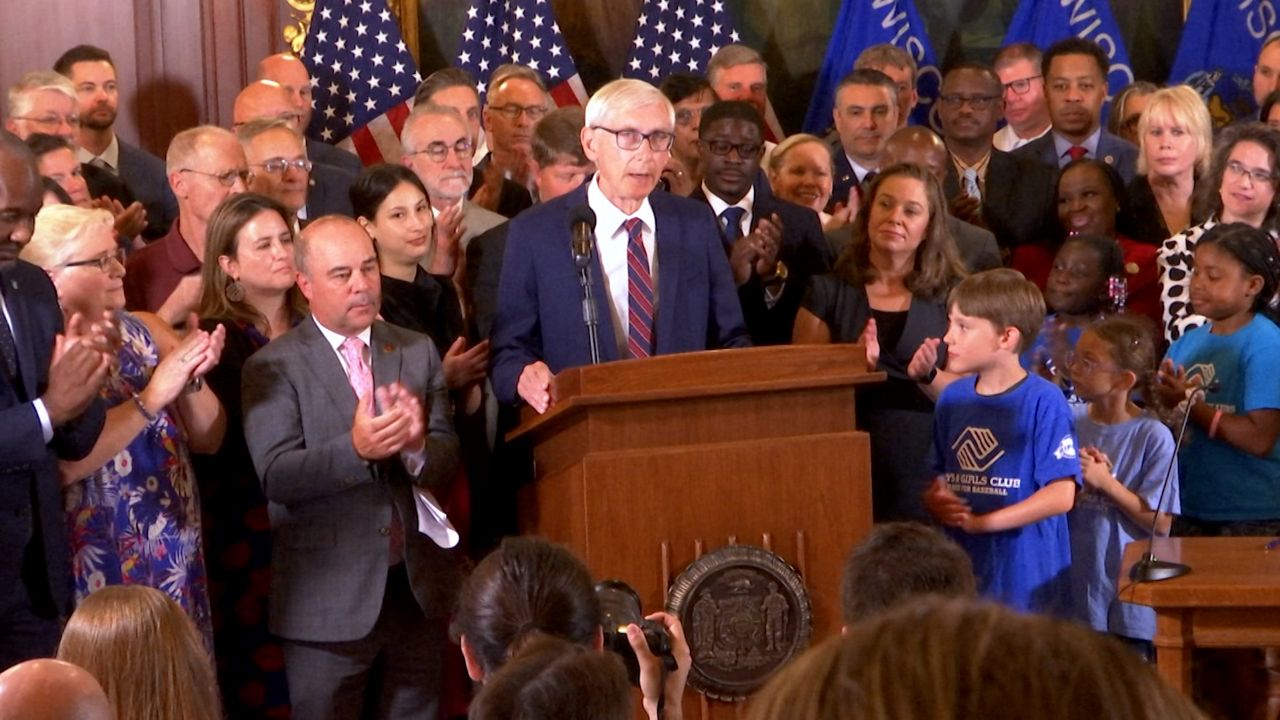MADISON, Wis. (AP) — Wisconsin Democratic Gov. Tony Evers on Tuesday called a special legislative session for September in a longshot attempt quickly dismissed by Republicans to approve funding they rejected earlier this year for child care services, a family leave program, the University of Wisconsin System and other efforts targeting the state's worker shortage problem.
Republicans who control the Legislature said they opposed his plan because it would increase government spending rather than cut taxes.
Republicans are under no obligation to debate, let alone vote, on the more than $1 billion in funding proposals Evers put forward. Republicans have routinely ignored special session calls Evers has made in the past on a wide array of issues, including legalizing abortion, cutting taxes, gun safety, updating the state's unemployment system, addressing problems in the dairy industry and increasing funding for schools.
But calling a special session, which Evers did for Sept. 20, does bring attention to the issue.
“Today, I’m calling on the Legislature to finish their work on the 2023-25 biennial budget and pass a comprehensive plan to address our state’s chronic workforce issues. These challenges that have plagued our state for generations will continue, holding our economy, our families, and our state back if Republicans in the Legislature don’t take seriously the second chance I’m giving them, and urgently,” Evers said in a press release.
Despite record-low unemployment rates over the last four years, several Wisconsin industries still face significant challenges filling jobs. Part of that is due to a shrinking labor pool, according to the Evers administration.
Evers has proposed using over $1 billion of the $4 billion budget surplus to address the workforce challenges. The administration said this money would help protect the child care industry and ensure it’s “affordable and accessible for working parents and families.”
It would also expand paid family leave, invest in higher education and more.
Evers said his budget included “meaningful, comprehensive, long-term investments and solutions” to the workforce issues and that it would prevent those issues from “becoming an unmitigated crisis that would have calamitous consequences for Wisconsin’s already-strapped workforce.”
“Unfortunately, Republicans failed to meet the moment, sending my budget back to my desk absent critical investments in key areas that they know and publicly acknowledge are essential to the success of our state,” said Evers.
In late June, Republicans approved the two-year spending plan with cuts to the University of Wisconsin’s budget and with other cuts to child-care, including the program Child Care Counts.
Evers is calling on the Legislature to spend $365 million on child care statewide, primarily to make the pandemic-era Child Care Counts Program permanent. The program is slated to run out of funding in January. The program has handed out nearly $600 million to more than 4,900 child care providers from March 2020 through March 2023, according to the nonpartisan Legislative Fiscal Bureau.
Child care providers and other advocates have warned that losing the program would be devastating for families that have come to rely on it, particularly the working poor who have few affordable child care options. But GOP lawmakers approved spending a lesser amount on child care, saying the state can't afford to keep every pandemic-era program running.
Evers is also urging Republicans to spend $243 million to fund a paid family medical leave program that they also voted not to include in the state budget. The governor said the program would be self-sustaining by 2026, with benefits paid for through payroll contributions from both employees and employers.
Under his proposal, workers would be eligible for up to 12 weeks of paid family leave starting in 2025.
Evers is also calling for spending more than $66 million more on the University of Wisconsin System. The news comes a week after UW-Oshkosh announced it would be laying off workers, issuing furloughs and taking other steps to deal with an $18 million budget shortfall.
Evers also wants the state to spend nearly $200 million to build a new engineering building on the UW-Madison campus. The project was the top priority for university leaders, but Republican lawmakers rejected it. They said at the time that they were open to considering funding in the future.
Evers is also calling for spending $100 million to continue a regional workforce innovation grant program, $60 million to address health care workforce shortages and $16 million targeting teacher shortages.
The governor signed the 2023-25 biennial budget more than a month ago with partial vetoes, calling it “imperfect and incomplete.” Since then, the Legislature has not returned to address issues.
Republican legislative leaders did not immediately return messages seeking comment.
The Associated Press contributed to this report.



